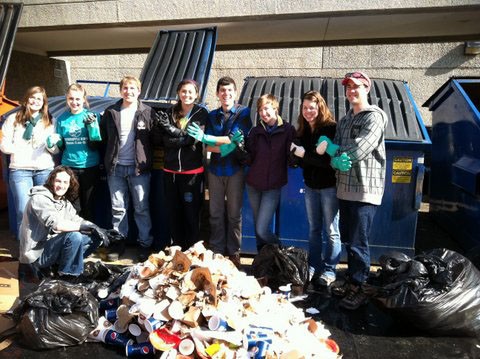GVSU participates in RecycleMania

GVL / Courtesy – Steven Leeser
Jan 19, 2015
Forming new habits can be a long and trying process. In order to help make positive choices for the environment, Grand Valley State University is using the spirit of competition to help make recycling a part of everyday life.
RecycleMania is an annual event that pits universities against each other to see who can recycle the most materials and reduce the most waste. The 10-week event goes from Jan. 18 to March 28 and consists of four primary competitions and four targeted material competitions.
“This is our eighth time participating,” said Steve Leeser, operations supervisor at Facilities Services. “It’s been a great opportunity for us to bring focus to the recycling program.”
Leeser said RecycleMania is a way to highlight recycling in a visual way and get groups involved. During the event, facilities uses a lot of techniques to raise awareness, such as handing out T-shirts, hanging up posters on bulletin boards and putting up banners.
“We run an ad every week in the Lanthorn that updates our progress,” Leeser said. “GVSU has always done well in the competition so far, and results have improved with each year.”
In 2014, GVSU was number one in Michigan for waste minimization and food service organics. GVSU is ranked fourth in Michigan and 124th nationally in the Grand Champion competition, although this event is based off of combined results including gross tonnage recycled and does not factor in school size.
“We started out strong, and it continues to grow,” Leeser said. “We composted twice as much per capita as the other schools,” Leeser said.
On Feb. 1, Leeser, who has organized GVSU’s RecycleMania efforts the previous seven years, will retire and Janet Aubil, facilities supervisor, will take his place.
“I recycle a lot, so to be able to teach kids and get it into their normal activities – it’s exciting,” Aubil said.
Aubil said making recycling a normal activity is the main challenge in getting people to recycle. Most people do not think of recycling as a part of their normal daily routine, and that has to change, Aubil said.
“We need to show the benefits,” she said. “We need to do this every single day, whether it’s a competition or not. Recycling stations are present in common areas for students, faculty and community members to use.”
In an effort to maintain maximum results, GVSU has taken steps to make recycling and composting as convenient as possible.
“We have recycling containers in all offices and recycling stations in break rooms so they have the ability to compost right in their own break room,” Leeser said.
Another difficulty recycling efforts face is the lack of knowledge and understanding of what exactly can be recycled.
“The only things that can’t be recycled are candy and gum wrappers, potato chip bags and soiled tinfoil,” Leeser said. “Nearly everything else is recyclable or compostable.”
Leeser added that a majority of items are thrown away, which affects both GVSU’s competition results and waste output in general.
“I would say 70 percent of what is thrown away could be recycled or composted,” Leeser said. “Even though our numbers are competitive, we could do better.”
For more information, visit http://www.gvsu.edu/sustainability/gvsu-recyclemania-90.htm.





















